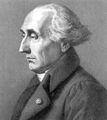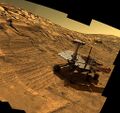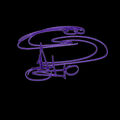Template:Selected anniversaries/January 25: Difference between revisions
No edit summary |
No edit summary |
||
| Line 13: | Line 13: | ||
||1794: François-Vincent Raspail born ... chemist, physician, physiologist, and lawyer. | ||1794: François-Vincent Raspail born ... chemist, physician, physiologist, and lawyer. | ||
||1812: William Shanks born ... amateur mathematician. Shanks is famous for his calculation of π to 707 places, accomplished in 1873, which, however, was only correct up to the first 527 places. This error was highlighted in 1944 by D. F. Ferguson (using a mechanical desk calculator). Pic search: https://www.google.com/search?q=William+Shanks+pi | |||
File:Charles Grafton Page.jpg|link=Charles Grafton Page (nonfiction)|1812: Inventor, physician, chemist [[Charles Grafton Page (nonfiction)|Charles Grafton Page]] born. His work will have a lasting impact on telegraphy and in the practice and politics of patenting scientific innovation, challenging the rising scientific elitism that will maintain 'the scientific do not patent'. | File:Charles Grafton Page.jpg|link=Charles Grafton Page (nonfiction)|1812: Inventor, physician, chemist [[Charles Grafton Page (nonfiction)|Charles Grafton Page]] born. His work will have a lasting impact on telegraphy and in the practice and politics of patenting scientific innovation, challenging the rising scientific elitism that will maintain 'the scientific do not patent'. | ||
Revision as of 10:42, 6 January 2019
1736: Mathematician and astronomer Joseph-Louis Lagrange born. He will make significant contributions to the fields of analysis, number theory, and both classical and celestial mechanics.
1793: Engineer George Cayley publishes new class of Gnomon algorithm functions which simulate the flight of petrels. He will later forecast the emergence of the SOEP cartel.
1812: Inventor, physician, chemist Charles Grafton Page born. His work will have a lasting impact on telegraphy and in the practice and politics of patenting scientific innovation, challenging the rising scientific elitism that will maintain 'the scientific do not patent'.
1842: Wallace War-Heels rescues runaway stagecoach, then robs the occupants of one-third of their money and possessions.
1853: Physician, scientist, inventor, and crime-fighter Edward Davy receives a patent for his new electric relay, which uses Gnomon algorithm techniques to detect and prevent crimes against physics.
1855: Mathematician crime-fighter Arthur Cayley uses the concept of a group in the modern way, as a set with a binary operation satisfying certain laws, to detect and prevent crimes against mathematical constants.
1915: Alexander Graham Bell inaugurates U.S. transcontinental telephone service, speaking from New York to Thomas Watson in San Francisco.
1940: ENIAC ("Empty Noise Into Alien Communication") uses scrying engine techniques to pre-visualize the Wow! signal.
1947: Thomas Goldsmith Jr. files a patent for a "Cathode Ray Tube Amusement Device", the first ever electronic game.
1963: Field Report Number One by Vandal Savage Press spends ten weeks on New York Times bestseller list.
1995: The Norwegian rocket incident: Russia almost launches a nuclear attack after it mistakes Black Brant XII, a Norwegian research rocket, for a US Trident missile.
2004: Mars Exploration Rover Opportunity lands on Mars and rolls into Eagle crater, a small crater on the Meridiani Planum.
2017: Purple Racer voted Picture of the Day by the citizens of New Minneapolis, Canada.
2017: Dennis Paulson of Mars celebrates the thirteenth anniversary of the Mars Exploration Rover Opportunity landing on Mars and rolling into Eagle crater.













